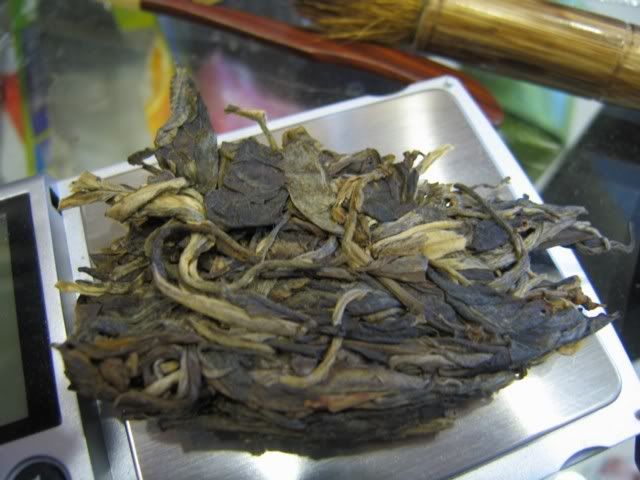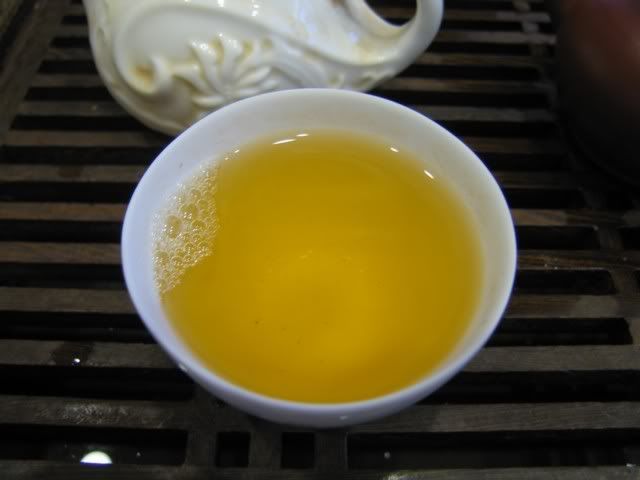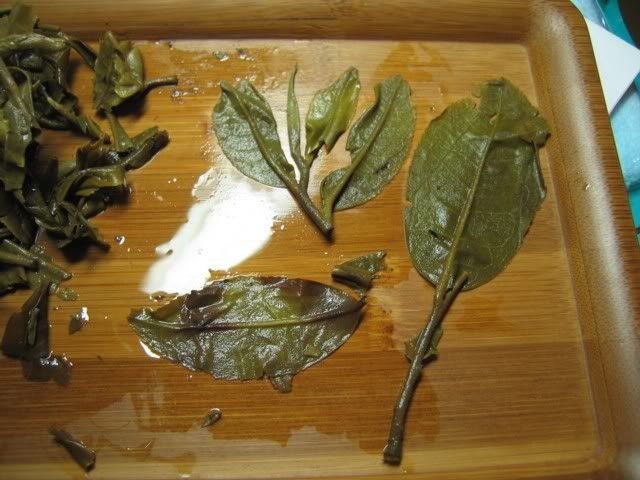Today’s tea is another sample from the Fuxing shop that I got.

This cake is made by Lu Lizhen, a Taiwanese tea maker who is one of the people behind the Zhenchunya Hao cakes. He owns a shop in Yingge, and presses his own cakes still. This cake is some sort of commemoration cake, and according to one of the people at the Fuxing shop, is basically a special order for a few people with too much money to blow. It uses good leaves and most of the cakes went straight from the factory to these people’s storage, and only very few got on the market.
As you can imagine, price for something like this is not going to be low.
I got this sample because I bought a fair amount of tea, and because the owner thought I should give it a try anyway. The dry leaves certainly look very nice — they’re big, hairy, and look robust. Let’s see how it fares in the cup.
It brews a liquor that is golden yellow

The aroma is that of a lightish Yiwu — young and impressionable, I suppose. It’s a delicate flavour that is rather subtle, and the first few infusions yields that Yiwu aroma, but not quite the qi and the thickness I would expect from a good, high priced, premium Yiwu cake. There’s virtually no roughness in the tea, and very little bitterness. It is, in fact, a little green in nature, which, as I’ve mentioned, I think is common for many 07 teas. I’m not sure why that would be the case, honestly, but I’ve found that to be a common theme for new teas this year. The tea does hit the throat though, with a solid aftertaste and a relatively long lasting throatfeel. I think the Chen Guang He Tang Spring tea from 2006 was better.
I wondered if Mr. Lu doctored the tea a little, because he is said to favour slight pre-fermentation to reduce bitterness and roughness in puerh. Supposedly, the Zhenchunya also went through a similar process. I don’t know if that’s what makes this tea a little “off” for me, comparing to other Yiwus I’ve tried. I find it overall a little lacking in character — it doesn’t quite do it for me. Something didn’t hit the spot.
The owner of the store did admit it is too expensive — she didn’t even get much of it to sell, thinking it’s too high a price to pay for new tea. Her customers mostly bought maybe one or two cakes at most, treating it more as a curiosity (because the tea isn’t too bad, after all, and the maker is famous).
I find this sort of thing to be quite common these days — high priced new cakes that are made by people with a reputation. They certainly have their reason for the price — the fame of the maker, the supposed quality of the tea, and the rarity of the production. When judged against cheaper stuff though, I don’t know if they will all hold up in, say, a blind taste test. Some, I think, will. I’ve had my share of excellent new teas from more famous makers that fully deserve the praise and price. Some others, however, are more likely to be just average tea riding on a good brand name. That, of course, is what a brand does — the brand itself has value. What I find troubling, however, is that in a market like puerh, where the producer of cakes do not have active control of raw materials (at least for many of the smaller producers) a strong cake from a brand in one year does not guarantee a good product the next year. There are also brands out there that are relatively unknown but sometimes produce good cakes anyway. I tend to favour those acquisitions, partly because they can be more reasonably priced for a tea that isn’t necessary inferior (sometimes far superior, even), but also because I enjoy the process of hunting for these things. That, in itself, has value for me. This is, after all, a hobby. The act of searching out for unknown but good cakes, the feeling of finding sometihng new, and the joy of getting my hands on some such things are all part of the enjoyment.
There’s also a business side of things — like this cake, many of these more famous, but small volume producers have sometimes pre-sold their cakes to select individuals who are basically dealers. They often hoard the cakes and then sell them very slowly, therefore limiting supply and in some ways artificially raising the price on the goods. It often mimics monopoly pricing — where each individual is charged what the market would bear (at an increasing price, of course), rather than a fixed price for everybody. You can do that when you’re the only person holding the 50 jian of tea for this particular production. Even a big factory like Menghai does this to a certain extent. From stories I’ve heard, while Menghai’s total production can be very high, they sometimes send certain productions to only certain dealers — and they control who gets what (the first line dealers have no say in what they get). So, this also creates artificial shortage in markets that didn’t get the cake (Beijing was a victim of this tactic on a few occasions when I was there last year), and thus drive up overall prices by creating an illusion of high demand. I don’t think that kind of tea is my kind of tea. Monopoly pricing is bad for you.
This cake has pretty leaves, but I don’t think I’m getting one.



0 responses so far ↓
There are no comments yet...Kick things off by filling out the form below.